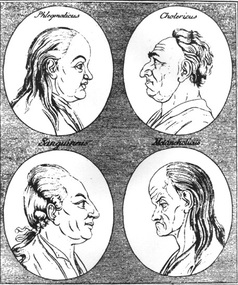Personality
Myers-Briggs and humanness – Whether you think the MBTI is a valid tool for the assessment of personality or not, the 4 sets of 2 letters is still a useful way of categorizing people. But here’s the thing -- I think in each set of letters, one is more human than the other, and the other is more subhuman than the other. So here’s how I break it down:
E is more human than I. (It’s superior to be people-oriented rather than object-oriented. And the most extreme form of I is the hermit, which I think goes against nature. We humans are social animals.)
N is more human than S. (It’s superior to see the big picture and connect information through patterns and so give them a greater meaning than to only be able to focus on little details and whatever happens to be right in front of you, like an animal.)
F is more human than T. (Emotion is higher than logic, because even a computer can follow logical instructions by rote, but only a flesh-and-blood human can feel and react. Think Spock, or autism. However, I think that this one should actually be split in two, because I think there’s some ways that T is superior [like with moral judgment].)
P is more human than J. (Better to follow one’s heart than be constrained by rules, which in the end, are artificial and arbitrary. Or put another way – better to follow the spirit than the letter. P is all about breathing freedom, and freedom is what all humans long for.)
On the other hand, J is more human because J's care more.
So here’s the problem – obviously, everyone’s human. In fact, everyone’s equally human. But the above observations still hold. So what’s the reconciliation? And in fact, I do think some people are more human than others. For example, I see women as being more human than men (men being solitary creatures whose full emotional development is stunted), and this may sound strange, but there have been many times when I honestly had to question how human my father is (not because he’s a man, but just because of his personality and who he is).
They tell everyone “follow your heart”, but does everyone want to? Does everyone have a heart? (Logical people, the T’s). And what about falling in love? Can’t even a logical person do that? So then what’s this about the T’s and the F’s?
Why is it in human nature to not know how to use reason and emotion in a balanced way? It seems that people use the two in a zero-sum manner; the more emotional you get, the less you can think straight, and the more logical you get, the less you can feel straight. Isn’t human perfection found in both?
E is more human than I. (It’s superior to be people-oriented rather than object-oriented. And the most extreme form of I is the hermit, which I think goes against nature. We humans are social animals.)
N is more human than S. (It’s superior to see the big picture and connect information through patterns and so give them a greater meaning than to only be able to focus on little details and whatever happens to be right in front of you, like an animal.)
F is more human than T. (Emotion is higher than logic, because even a computer can follow logical instructions by rote, but only a flesh-and-blood human can feel and react. Think Spock, or autism. However, I think that this one should actually be split in two, because I think there’s some ways that T is superior [like with moral judgment].)
P is more human than J. (Better to follow one’s heart than be constrained by rules, which in the end, are artificial and arbitrary. Or put another way – better to follow the spirit than the letter. P is all about breathing freedom, and freedom is what all humans long for.)
On the other hand, J is more human because J's care more.
So here’s the problem – obviously, everyone’s human. In fact, everyone’s equally human. But the above observations still hold. So what’s the reconciliation? And in fact, I do think some people are more human than others. For example, I see women as being more human than men (men being solitary creatures whose full emotional development is stunted), and this may sound strange, but there have been many times when I honestly had to question how human my father is (not because he’s a man, but just because of his personality and who he is).
They tell everyone “follow your heart”, but does everyone want to? Does everyone have a heart? (Logical people, the T’s). And what about falling in love? Can’t even a logical person do that? So then what’s this about the T’s and the F’s?
Why is it in human nature to not know how to use reason and emotion in a balanced way? It seems that people use the two in a zero-sum manner; the more emotional you get, the less you can think straight, and the more logical you get, the less you can feel straight. Isn’t human perfection found in both?

